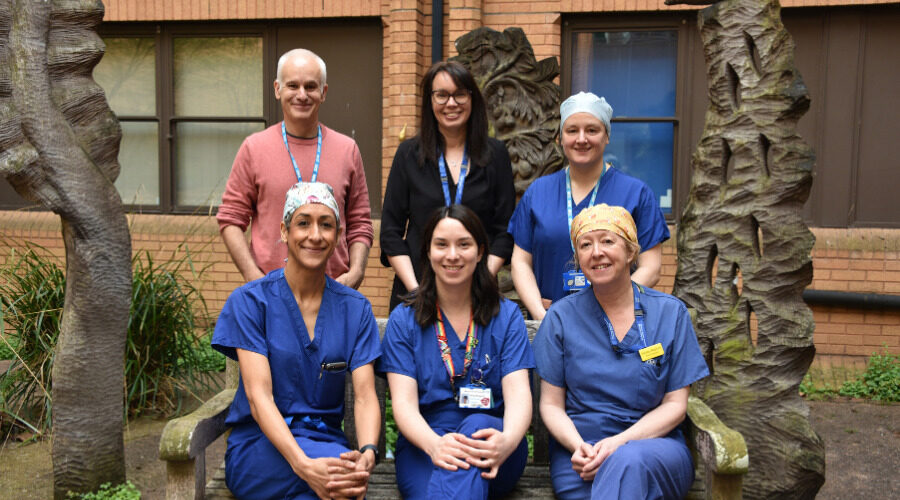
Spotlight
Delivering joined up care through our endometriosis service
Every March, people around the world come together to support Endometriosis Action Month, raising awareness of the condition, which affects 1 in 10 women, or those assigned female at birth.
Despite the condition affecting over 1.5 million people in the UK, there are still many people who don’t know what endometriosis is, and the huge impact it has on the lives of those who live with it.
Endometriosis is a condition where tissue similar to the lining of the womb grows in other places, such as the ovaries/fallopian tubes, bowel, or bladder. Symptoms vary, but common symptoms include pain in your lower tummy or back/pelvis, fatigue, nausea, heavy periods, and problems with infertility. There is no cure for the condition, so for those diagnosed, they could be coming into NHS services for most of their lives.
This year, our endometriosis service was accredited as an ‘Endometriosis Centre’ by the British Society of Gynaecological Endoscopy (BSGE), having met strict criteria to qualify – but it’s been a long process and lots of hard work by our teams to reach this incredible achievement.
Our endometriosis nurse specialist, Hayley Waghorn, has been working within the service for the past four years, and has made some significant improvements over that time.
“While the endometriosis service has been around for some time, we had to work very hard following the pandemic, when services were able to resume fully again,” explains Hayley. “The BSGE also used this as an opportunity to elevate endometriosis services across the country, and I was given the opportunity to work with a mentor at a larger, well-established service in St Michaels Hospital in Bristol.
“This exposure led to me developing strong links with other specialities within our own trust, such as our pain management team, colorectal and stoma teams, urology and gynaecology, and pelvic health physiotherapists. We also have links with oncology too. Endometriosis is a whole-body disease, so it’s important that as a system, we’re offering a really holistic approach to care.
“Surgery can help with managing the symptoms of endometriosis, but it isn’t necessarily a suitable solution for everyone. This is why caring for someone with the condition is best tackled as a group, as symptom management very much needs a multi-disciplinary approach.”
Hayley works alongside a team of specialists, including consultant obstetrician and gynaecologist, Balpreet Attilia, consultant urologist, Andrea Cannon, and colorectal surgeon, Shelly Griffiths, as well as teams such as the pelvic health physio team. Together they see patients from across Somerset who have been referred either through their GP, or from linked services such as oncology.
The team also works alongside consultant radiologists, meeting monthly to discuss the more complex patients who come into the service, whose condition may need more thorough discussion and investigation before decisions are made to proceed to any surgery.
“It’s very hard to describe pain and bleeding generically for this condition, as it can differ from person to person, but essentially, if it’s affecting your quality of life, you should speak to someone,” continues Hayley.
“The average diagnosis time is up to eight years, and it’s sad that many patients come in with low expectations. Often patients with endometriosis have had a ‘rocky road’ to any sort of diagnosis and by the time they reach us, they are very demoralised and frustrated. We are all part of a team of services working together to care for endometriosis patients, we want to make sure they feel fully supported, regardless of the treatment management path they decide.
“It’s also important to share that while we have an endometriosis service, and we now hold centre status, the team who work on this service are also all delivering care elsewhere across the trust. My role is also partially within the operating theatre too, while all the consultants I work with also cover their own specialities. For example, Ms Attilia may be on-call for obstetrics right after we finish our endometriosis theatre list, and Ms Griffiths off to do her own clinics too.
“There’s still a huge lack of research on endometriosis as a condition, as well as broader women’s health, but I think there’s been a spotlight on this area of healthcare recently, and that’s driving a lot of the progress we’re seeing in how we’re able to care for patients now.”
The Department of Health and Social Care has recently launched a national survey on women’s views on reproductive health, which seeks to gather vital data on women’s menstrual health, contraception, pregnancy planning, and menopause. It’s part of the wider Women’s Health Strategy, which sets out how the government will improve and boost health outcomes for women, girls, and those assigned female at birth.
Hayley explains: “Endometriosis is driven by oestrogen, so for anyone that has undergone a full hysterectomy (ovaries removed too), they can often experience relief from pelvic pain symptoms and effectively may no longer experience the symptoms of endometriosis – however, there are no guarantees. It can fully depend on the extent of the disease, the amount of surgery a person has had, and on their symptoms, as to whether they still require further treatment through the service.
“Regardless of someone’s gender identity, if they are experiencing symptoms, we will see them, and can tailor our care and approach depending on their needs. We are very active in a newly-formed Transgender Task Group, which is currently looking at the care that we currently provide within the trust and the wider area.”
If you’d like to learn more about our endometriosis service, please contact endometriosis.specialistnurses@somersetft.nhs.uk.

